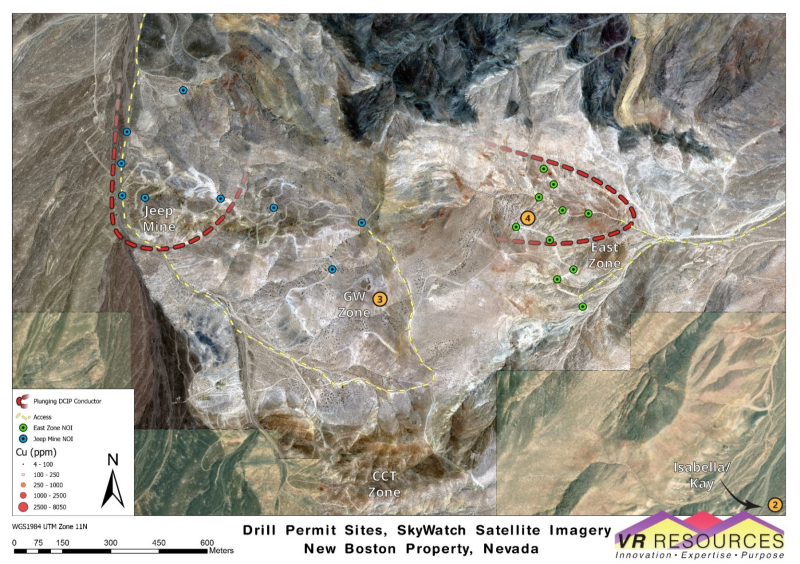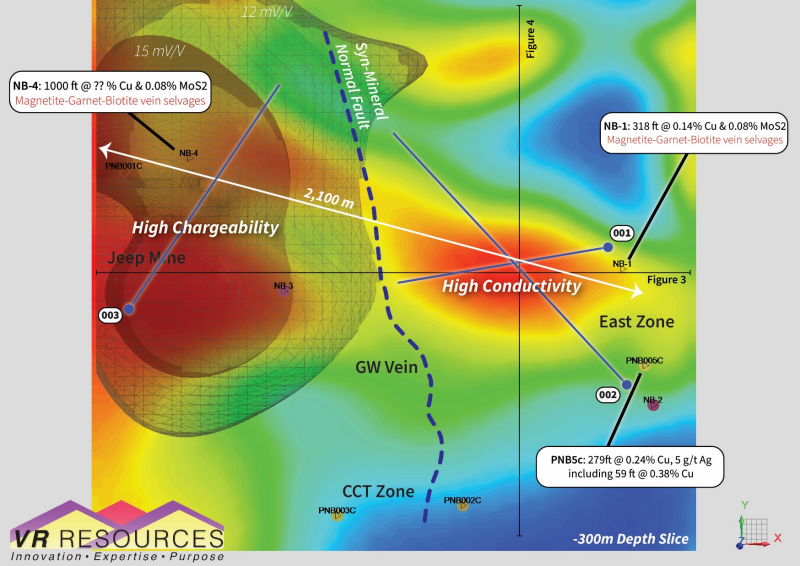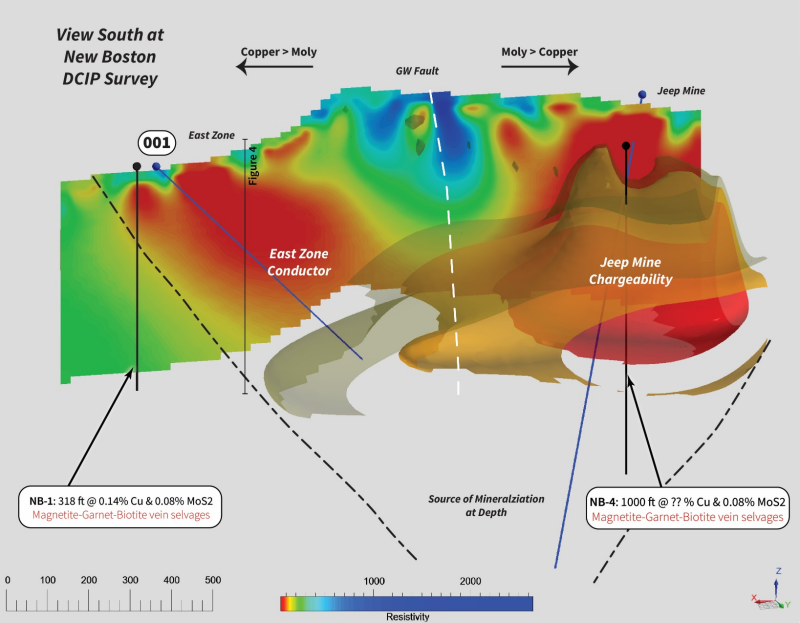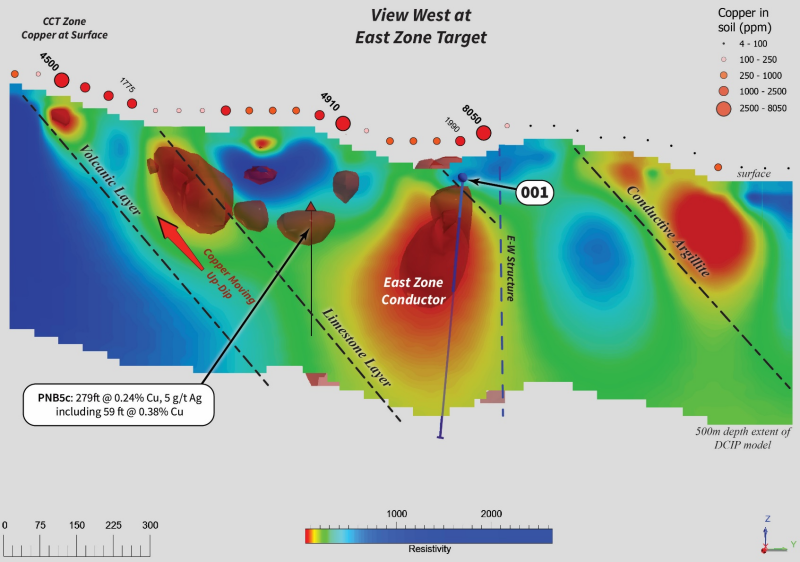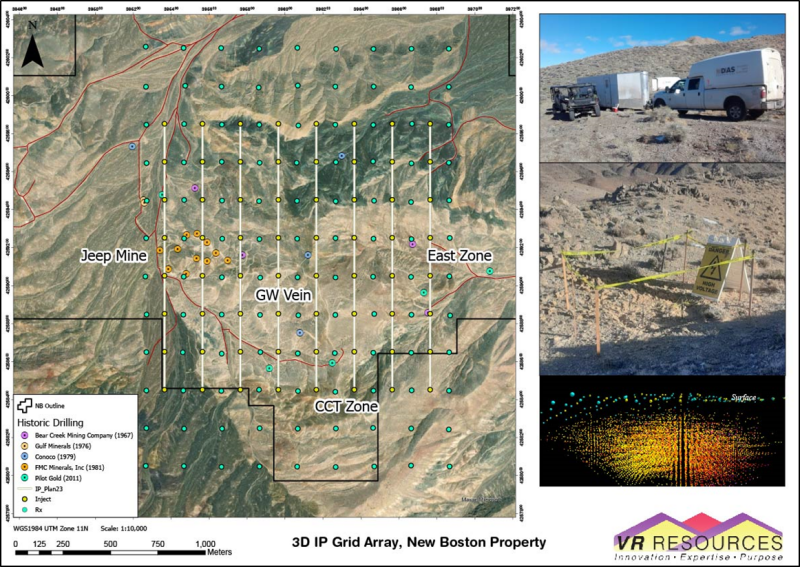Archive
VR receives NOI drill permit for New Boston, and prioritizes drill targets for the copper-moly-silver porphyry system in western Nevada.
 | |||||||||
Vancouver, BC - TheNewswire - November 14, 2023 - VR Resources Ltd. (TSX.V:VRR) (FSE:5VR) (OTC:VRRCF), the "Company", or “VR”, has received its first NOI drill permit for its New Boston property and polymetallic copper-moly-silver porphyry system located in west-central Nevada.
Figure 1. Satellite image showing selected drill sites for NOI permit applications for New Boston.
For strategic reasons, two separate NOI permit applications have been prepared to cover both the large IP chargeability anomaly at Jeep Mine and the large conductivity anomaly at East Zone (EZ), respectively. The conductivity anomaly at East Zone is the priority and, as such, its NOI permit was submitted first and has been approved and received within the standard 15-day timeframe. The Jeep Mine NOI application has been similarly prepared for submission and timely approval.
Geophysical Targets for Drilling
-
Figure 2. Jeep Mine and East Zone anomalies on conductivity plan map with superimposed IP isoshells.
-
Figure 3. East-west profile through the 3D conductivity block model, showing convergence of Jeep Mine and East Zone anomalies at depth, below the central GW fault and mineralized gossan.
-
Figure 4. North-south cross-section of conductivity block model, showing East Zone conductor as the potential porphyry stock source to copper mineralization on surface at CCT Zone.
The East Zone Target for Copper
The ground DCIP conductor at East Zone has been given top priority based on its size, and on its proximity to known copper mineralization: the best anywhere on the property covering the entire 4 km vein system:
-
Copper at surface. The core of the conductor comes to surface into a patch of maroon-coloured soil amongst hematite skarn and intense quartz vein stockworks, with up to 0.8% copper in soil
-
Copper Intersections. A 2010 drill hole located 300m to the south of the conductor, up-dip in limestone, intersected 279ft @ 0.24% Cu from 12ft depth, coincident with a small conductor;
-
Strike length. Starting from the maroon soil surface expression, the EZ conductor extends 900 m to the northwest on plan map, and converges with the Jeep Mine conductor at depth (Figure 3);
-
Open to depth. The EZ conductor plunges from surface through the 500 metre depth extent of the 3D voxel model; amplitude strengthens and volume increases with depth, and is open.
The new conductor at East Zone offers the potential to discover a mineralized porphyry stock that is the source of the system of mineralized, sheeted quartz veins exposed on surface over a 4 km strike. Why?
1. There are bona fide polyphase stockwork vein geometries of quartz with copper sulfide, at surface;
2. There are bona fide dacite porphyry dykes together with quartz monzonite stocks, at surface, and;
3. There are bona fide high temp. potassic alteration mineral assemblages with biotite and magnetite.
Site Visit & Field Video
VR completed a site visit to New Boston last week; a short field video is available on the Home Page of the Company’s website at www.vrr.ca. The purpose of the trip was to meet with potential drill contractors in person, in the field, to discuss the logistics for the planned first-pass drill program at East Zone.
CEO Comment
From VR’s CEO, Dr. Michael Gunning: “We are ready. The East Zone permit is in hand, and a field meeting with drill companies to discuss how best to approach the East Zone conductor holes is now under our belt, so planning can begin.
Conoco branded New Boston as world class and perhaps one of the largest known moly systems in the world at the time - during the porphyry exploration boom in western North America from the 1950s through the 1970s, before exploration came to a grinding halt in 1981. We intend to finish what Conoco started at New Boston, by using new DCIP technology to image and discover a porphyry stock that they inferred at the heart of the system of sheeted veins, but could not identify and therefore did not drill test. In addition, we will demonstrate, with the aid of modern, ICP-MS geochemistry, the polymetallic grade potential of the system at New Boston for copper and silver, in addition to the moly.
The US government has recently added copper to the top of its Critical Metal list for domestic, raw material supply for sustainable, downstream technologies and industries as the Green Economy emerges. Nevada has both a long history in mining and a well-established pedigree and endowment in copper, and we believe that New Boston has both the size and polymetallic grade composition to contribute.
I encourage shareholders to review the figures herein and on our website in order to fully appreciate the size, amplitude and clarity of the conductivity anomaly at East Zone that we intend to drill. Especially the consistent correlation between copper and conductivity as shown in Figure 4 herein, and as underscored by photos of copper mineralization at New Boston provided in the previous news release on October 31st.
Description of DCIP Geophysical Survey
Figure 5. Satellite image showing the ground-based 3D IP geophysical survey completed in April by DIAS Geophysical Limited using its proprietary DIAS32 DCIP technology and grid array of transmitter and receiver stations with real time radio frequency data collection.
An equant grid of 200 metre–spaced stations over a survey a 1.6 x 2.2 km block covers the 2,100m strike of sheeted veins exposed on surface in the main part of the skarn and porphyry system exposed on surface at New Boston.
The survey generated more than 80,000 data points for inversion modeling and resultant 3D models of chargeability and resistivity.
Technical Information
Summary technical and geological information for the Company’s various exploration properties including New Boston is available at the Company’s website at www.vrr.ca.
Technical information for this news release has been prepared in accordance with the Canadian regulatory requirements set out in National Instrument 43-101. Justin Daley, P.Geo., VP Exploration and a non-independent Qualified Person oversees and/or participates in all aspects of the Company’s mineral exploration projects, and the content of this news release has been reviewed on behalf of the Company by the CEO, Dr. Michael Gunning, P.Geo., a non-independent Qualified Person.
About the New Boston Property
Location
New Boston is within the Walker Lane mineral belt and structural province in west-central Nevada. More specifically, it is within the co-spatial belts of Jurassic and Cretaceous aged copper and moly porphyry deposits, including the Yerington camp and Hall deposit.
New Boston is located in the Garfield Range in Mineral County, approximately 150km southeast of Reno. Vegetation is sparse in the range; outcrop or colluvium predominate on the property itself, with quaternary cover developed off its eastern border and eastern flank of the range.
The property location facilitates cost-effective exploration, year-round. Access is from the nearby town of Luning, located just 5km to the east on State Highway 95 connecting Reno and Las Vegas. The property itself is criss-crossed by a myriad of active, historic trails and roads which are reachable from the highway.
Property Description
The New Boston property is large. It consists of 77 claims in one contiguous block approximately 3 x 5km in size and covering 583 hectares in total (1,441 acres). It covers the entire extent of the known copper-moly-silver porphyry-skarn mineral system exposed on surface between Blue Ribbon and East Zone, and its inferred down-dip potential to the north.
The property is on federal land administered by the Bureau of Land Management (BLM). There are no state or federal land use designations, or privately-owned land which impede access to the property; nor is the property within the BLM’s broadly defined area of sage grouse protection.
The property is owned 100% by VR. There are no underlying annual lease payments; nor are there any joint venture or back-in interests. The vendor of the property retains a royalty.
About VR Resources
VR is an established junior exploration company based in Vancouver (TSX.V: VRR; Frankfurt: 5VR; OTCQB: VRRCF). VR evaluates, explores and advances opportunities in copper, gold and critical metals in Nevada, USA, and Ontario, Canada, and most recently, a kimberlite breccia pipe discovery in northern Ontario. VR applies modern exploration technologies and leverages in-house experience and expertise in greenfields’ exploration to large-footprint mineral systems in underexplored areas/districts. The foundation of VR is the proven track record of its Board in early-stage exploration, discovery and M&A. The Company is well-financed for its mineral exploration and corporate obligations. VR owns its properties outright and evaluates new opportunities on an ongoing basis, whether by staking or acquisition.
ON BEHALF OF THE BOARD OF DIRECTORS:
“Michael H. Gunning”
____________________________
Dr. Michael H. Gunning, PhD, PGeo
President & CEO
For general information please use the following:
Website: www.vrr.ca
Email: info@vrr.ca
Phone: 778-731-9292
Forward Looking Statements
This news release contains statements that constitute "forward-looking statements". Such forward looking statements involve known and unknown risks, uncertainties and other factors that may cause the Company’s actual results, performance or achievements, or developments in the industry to differ materially from the anticipated results, performance or achievements expressed or implied by such forward-looking statements. Forward-looking statements are statements that are not historical facts and are generally, but not always, identified by the words "expects," "plans," "anticipates," "believes," "intends," "estimates," "projects," "potential" and similar expressions, or that events or conditions "will," "would," "may," "could" or "should" occur. Forward-looking statements in this document include statements concerning VR’s expectations concerning the Hecla-Kilmer property and all other statements that are not statements of historical fact.
Although the Company believes the forward-looking information contained in this news release is reasonable based on information available on the date hereof, by their nature forward-looking statements involve assumptions, known and unknown risks, uncertainties and other factors which may cause our actual results, performance or achievements, or other future events, to be materially different from any future results, performance or achievements expressed or implied by such forward-looking statements.
Examples of such assumptions, risks and uncertainties include, without limitation, assumptions, risks and uncertainties associated with general economic conditions; the Covid-19 pandemic; adverse industry events; future legislative and regulatory developments in the mining sector; the Company’s ability to access sufficient capital from internal and external sources, and/or inability to access sufficient capital on favorable terms; mining industry and markets in Canada and generally; the ability of the Company to implement its business strategies; competition; and other assumptions, risks and uncertainties.
The forward-looking information contained in this news release represents the expectations of the Company as of the date of this news release and, accordingly, is subject to change after such date. Readers should not place undue importance on forward-looking information and should not rely upon this information as of any other date. While the company may elect to, it does not undertake to update this information at any particular time except as required in accordance with applicable laws.
This news release may also contain statements and/or information with respect to mineral properties and/or deposits which are adjacent to and/or potentially similar to the Company’s mineral properties, but which the Company has no interest in nor rights to explore. Readers are cautioned that mineral deposits on similar properties are not necessarily indicative of mineral deposits on the Company’s properties.
Trading in the securities of the Company should be considered highly speculative. All of the Company’s public disclosure filings may be accessed via www.sedarplus.ca and readers are urged to review them.
Neither the TSX Venture Exchange nor its Regulation Services Provider (as that term is defined in Policies of the TSX Venture Exchange) accepts responsibility for the adequacy or accuracy of this release.
---
Figure 1. Satellite image with drill site locations in the Notice of Intent (NOI) drill permit applications for the East Zone and Jeep Mine areas, respectively. Red dashed arcs are the conductivity anomalies shown in Figure 2, derived from the DCIP survey completed in April. Numbered orange circles refer to photos of copper mineralization provided in the previous new release, NR-23-22.
Figure 2. Plan map with IP isoshells overlain on a conductivity depth slice base map. The IP anomaly at Jeep Mine is cored by increasing conductivity at depth; New Boston is a low-pyrite system, so the low mV/V chargeabilities are consistent with base metal sulfide. The East Zone conductor is the largest and highest amplitude in the entire survey, with near-surface conductors consistently correlated with intense copper sulfide mineralization at surface. Blue lines are schematic drill traces for planned first-pass drill holes by VR; there are no historic drill holes into the East Zone conductor, period.
Figure 3. View south at east-west profile slice through the 3D conductivity model shown on plan map in Figure 2. Copper-silver veins on surface along the GW fault and gossan trace (see Figure 2) emanate vertically upwards from the central part of this view where the Jeep Mine and East Zone conductors converge. Shown schematically are two of the planned drill holes; there are no historic drill hols in the East Zone conductor, period.
Figure 4. North-south cross-section through the 3D conductivity model shown on plan map in Figure 2. Note soil copper geochemistry above the profile, with up to 0.8% Cu above East Zone conductor which is modeled as the source for the copper which has migrated up-dip in limestone strata to surface at the CCT Zone. Notice the strong correlation between copper in hole PNB5c as it intersects a small conductor, compared to the much larger East Zone conductor which plunges 900 m into the plane of this page, is open to depth, and ultimately converges with the Jeep Mine conductor to the west (Figure 3).
Figure 5. Outline of ground-based 3D-array DCIP geophysical survey completed over New Boston by DIAS Geophysical Limited in the spring of 2023. The survey block is 1.6 x 2.2km in size, with an equant grid array of 200 metre-spaced receiver and transmitter stations for real time data collection and generation of more than 80,000 data points for the resultant 3D inversion models (lower right).
